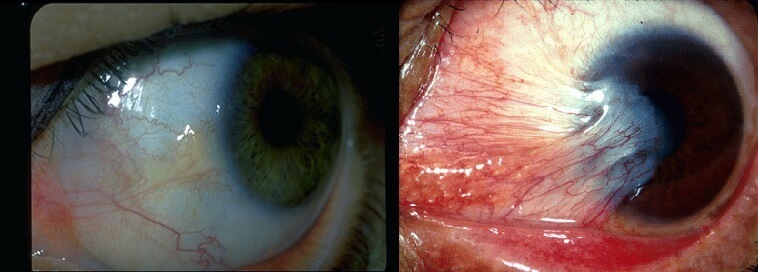July 27th, 2016
Most of us know that sunlight and its ultraviolet (UV) radiation are harmful to our skin and can cause cancer. Therefore, most of us are good about using sunscreen when outdoors. But did you know that the sun’s UV rays can also cause damage to your eyes?

Research has shown that sunlight and UV radiation are linked to a number of conditions in the eyes, such as cataract, macula degeneration, pinguecula, pterygium, and more. For this article, we are going to focus on the front/anteriorsection of the eye that is susceptible to UV rays.
First and foremost, the skin of our eyelids is equally at risk for skin cancer as the rest of our body. While most of us are good about using sunscreen when we are outside, the problem is that when it’s time to apply sunscreen, we tend to skip the area around the eyes because we do not want sunscreen to get in our eyes and cause us to tear or feel a burning sensation. And when we do that, we are exposing our eyelids to harmful UV rays that could cause cancerous lesions to grow. This is where wearing sunglasses with 100% UV protection can be beneficial, because the lenses act as a shield to block the sunlight.
Secondly, the cornea and conjunctiva, or the tissue over the “white part and colored part” of our eyes, are also at risk for sun damage. Have you ever seen someone, or perhaps yourself, with a yellow or white tissue growth on the front of their eyes? Those growths are called pingueculas or pterygiums, depending on their location and severity, and are also known as “Surfer’s Eye.”. They are essentially a benign overgrowth of the conjunctival tissue; but as it increases in size, not only will it grow over the cornea (tissue over the colored part of the eye) and cause induced astigmatism, it may also start to cause problems such as irritation, redness, stinging, burning, and pain in some patients.
We’re lucky to live in southern California where we get to enjoy the sun year round, but it’s easy to forget just how harmful the sun’s UV rays can be. Remember to always wear sunscreen (even on your eyelids) and have sunglasses on when you’re out soaking in the sun!
Photo credits: Eye Institute Auckland and Jonathan Trobe, M.D., University of Michigan Kellogg Eye Center